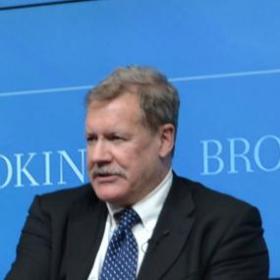
European Hero: Needed in Ukraine
EWI Professorial Fellow Greg Austin discusses John Mroz's leadership, and explains why the diplomacy he championed is needed more than ever to resolve the crisis in Ukraine.
If you don’t know the name John Mroz, you may like to learn more about him. He made as strong a contribution as any private citizen may have to ending the division of Europe and the Cold War. His vision is sorely needed in Ukraine today. The “EastWest process” which he championed could help us build a new modus vivendi between Russia and the West.
The governments of Germany, Slovakia and Romania have recognized, with formal honors, the historic contribution of Mroz in Europe. But his work did not stop once the Berlin Wall fell. Over the subsequent two decades, Mroz led the establishment of the most comprehensive suite of high level Track 2 dialogues between the United State and China. He laid the groundwork for one of the earliest three-way dialogues between the Taliban, Afghanistan and Pakistan, and he established grass roots conflict prevention work in the former Yugoslavia.
Mroz worked his peacemaking as head of the EastWest Institute (now called EastWest for short) after setting it up in 1981 until his untimely death in August 2014. In those 33 years, he accumulated as much time inside the White House and the Kremlin combined as almost any person outside of the two governments might have.
Mroz did not invent second track diplomacy, but he can be regarded as one of the founding fathers of its practice. He set up EastWest before the term ‘second track diplomacy’ came into common use. Mroz saw collaboration between opposing parties as the only pathway to resolving seemingly intractable conflicts. If collaboration was not possible, dialogue was essential.
Once the political violence escalated in Ukraine in February 2014, Mroz felt strongly that this vision of peacemaking was needed again between Washington, Moscow and Kyiv.
One might readily agree with the skeptics, who argue that dialogue on Ukraine, governmental or non-governmental, will lead nowhere as long as violence continues. Yet against that judgment, as Mroz had believed, we need to consider the certainty that a reduction in dialogue increases the threat to security and the risk of more serious violence.
On the opposing side, there is also the argument that in such tense times as we now have between Russia and the United States, NGOs like EastWest should not interfere with existing diplomatic tracks that are already complex enough. The two countries, with Europe in the middle, are vigorously defending their conflicting positions and even debating what is fact and what is not. Many peace NGOs have repeatedly challenged the “stay out” exhortation from governments. Citizen diplomacy is, after all, premised on independence from them.
By contrast, one of the main talents of Mroz was precisely in this area: he could engage with deeply conflicted governments who at times preferred he not be there and eventually convince them that there was value in his EastWest process.
He was convinced that there was no set formula for effective Track 2 work. He was equally certain that one of the best paths to effective intervention by NGOs could be found by working at the front lines of political conflict with high level leaders.
Mroz felt that the best Track 2 diplomacy had to be a highly personalized undertaking. He was one of its best exemplars. He achieved many successes at the helm of EastWest, including work with Ukraine. This short piece is written on the occasion of commemoration in New York this week of his life. John Mroz was a hero of our time. We need another to step forward with an action plan that can perpetuate the Mroz legacy and begin to reverse the current, grave crisis involving Ukraine, Russia, the United States and Europe.
Read the piece at New Europe

